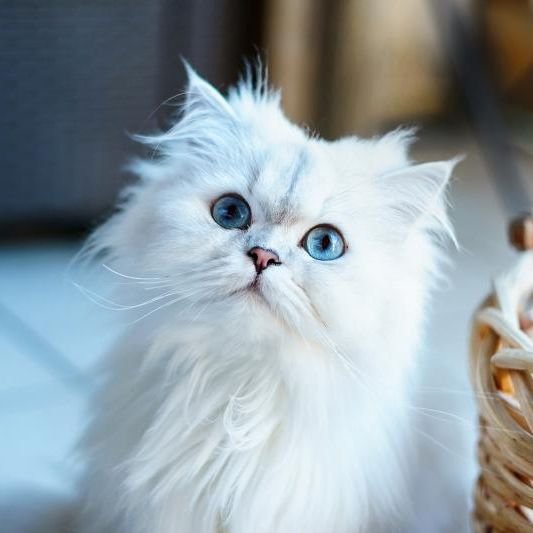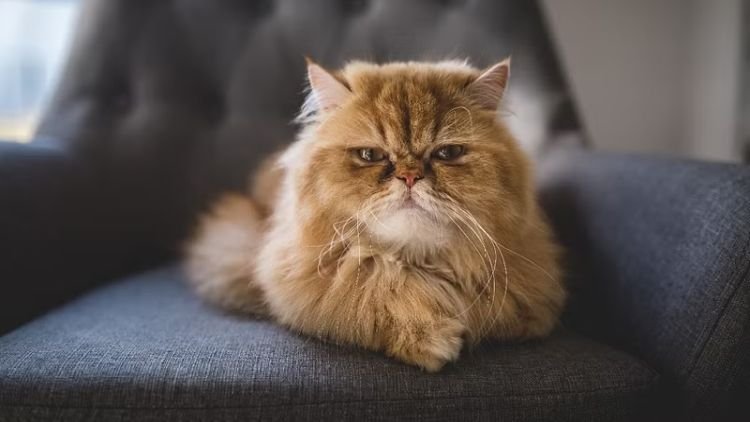
The Persian cat is perhaps one of the most well-known and beloved of cat breeds, although its popularity has been dropping in recent years.
It was the most popular of pedigree felines in the United States back in 2008 but has since fallen to the 4th spot as of 2017, right behind the British Shorthair, Ragdoll, and Exotic.
Indeed, it has a long and colorful history, having been instrumental in the creation of the Himalayan and Exotic Shorthair breeds, and with cat fanciers having experimented with all manner of variations.
It is also known as the “Shirazi Cat” in Iran.
Pay the Price – Buying A Persian Cat
Before you head out and begin to contact breeders regarding upcoming litters, consider that the Persian Cat is very popular and there is almost always a rescue shelter that has one.
Adopting a cat has many benefits over purchasing one. It helps a shelter save resources, gives the animal a new home with a chance to be loved again, and it saves you a lot of money on various expenses associated with the cat.
Specialty Purebred Cat Rescue is the largest organization in the Midwest dedicated to helping animals find homes. It currently charges $50 to $125 to rescue domestic cats, $75 to $175 for purebred mix cats, $100 to $400 for purebred cats, and $250 to $600 for rare breed purebred cats.
These numbers may seem high at first, and indeed, you may even be wondering why there’s a fee in the first place.
The adoption fee helps to cover the many expenses that the animal has incurred while staying at the shelter, as well as the cost of medical care and other services. Here is a list of how much you can save by adopting a Persian:
- Vet Exam / Wellness Exam – $50 to $100
- Neutering – $150 to $300
- Canine Distemper Vaccination – $20 to $30 (x2)
- Rabies Vaccination – $15 to $25
- Feline Leukemia / FIV Test – $30 to $50
- Flea / Tick Treatment – $50 to $200
- Microchip – $50
- Deworming – $20 to $50
- Collar and/or ID Tag – $5 to $10
Adopting a Persian means you may not have to spend for one or all of these services as they are provided by the shelter in most cases.
The Persian and Himalayan Cat Rescue is a group of volunteers that also supports those two specific cat breeds. Its adoption fee is a very affordable $175 for Persians and Himalayans over 4 years of age and $225 for younger ones under 4 years of age.
A few other great resources for finding Persians for adoption are Adopt-a-Pet, Petfinder, and the Persian Rescue Network and RescueMe groups on Facebook.
The regular Persian cat price at a cattery like Doll Face Persians ranges from $4,000 to $7,000 depending on the color of the kitten. A $200 non-refundable deposit is required to reserve the kitten within 48 hours.
Pelaquita Persians sells kittens for a lower price, but it still ranges from $900 to $2,000. If you don’t mind getting an older cat, retired adults can be purchased for $600 to $800.
Ultimately, the price can swing wildly depending on the color rarity and whether the cat is to be used in competitions or simply as a home pet. Given the popularity of Persian Cats, expect prices to match the demand.
If a purchased kitten needs to be shipped to another state, the buyer is responsible for shouldering the cost in most cases. There are several ways to bring your pet home – either drive it yourself, ship it by air or use a cat transporter.
uShip is a company that can help you find a good shipper in your area, and the service is estimated to cost on average $1.54 per mile for 100 miles or less, and $0.42 per mile for 1000 miles or less. Recent users have reported paying between $120 and $600 for a cross-country shipment.

Additional Expenses to Prepare for When Raising a Persian Cat
Once you bring your new Persian kitten home, there’s a couple of things that you may want to prioritize first. Food, toys, and accessories are the essentials, followed by tracking services and perhaps licensing.
Persian cats, like all felines, are carnivores; which means that they need meat – lots of it! Their food needs to be high in protein and less on vegetables, fruits, and grains.
An adult cat will only need to eat twice a day, but kittens are voracious and may need several feedings. Be cautious not to overfeed – follow the directions provided on the label of the cat food that you purchase.
Wet food and high-quality raw meat are good for Persians. Just beware of products with too much fat. Dry food should be included in the diet in order to promote good intestinal health and provide a source of fiber.
Royal Canin has a few good products that can be used throughout your Persian’s life. Its dry kitten food costs around $20 for a 3-lb bag while the adult version is around $30 for a 7-lb bag.
A good choice of wet food is Blue Freedom Grain-Free Canned which costs around $32 for a 24-pack of 5.5-oz cans.
Two of the most important items you’ll need when your kitty gets older besides toys and other small doodads are a travel carrier and a scratching post. Persians are notorious scratchers which is actually part of their normal grooming behavior.
The cost of a scratching substrate at Chewy will cost as little as $3 for a simple scratching pad, to as much as $90 for a 27-inch cat tree and scratching post.
For a recommended airline-approved cat carrier, the Pawfect Pets Soft-Sided carrier will fit nicely under the seat in front of you. It also comes with two fleece pet mats for added cushioning and interior protection. This product is fairly-priced at $40.
In certain states, it is mandatory for animals to be registered and licensed. In Omaha, for example, all dogs, cats, and mini pigs must be licensed at 4 months of age.
A pet must be vaccinated for rabies before it can apply for a license. According to the Nebraska Humane Society, license fees are $52.25 for an unneutered cat and $14.25 for a neutered one. This is considered a recurring cost, as licenses need to be renewed annually.
Once your Persian matures and begins to enjoy its adult life, there will inevitably be a need to visit a veterinarian again for checkups or medical attention. Many modern Persian variants are brachycephalic (flat-nosed) which make them prone to breathing difficulties and skin/eye problems.
Experts have found that Polycystic Kidney Disease (PKD), which causes kidney failure, occurs in about 35% to 49% of Persians.
All About Animals is the largest high-quality non-profit animal welfare organization in Michigan and it offers major services for the following prices. Take note that this clinic receives grants from multiple companies which allow it to offer discounted rates:
- Spay/Neuter – $40
- Rabies Vaccination – $15
- Feline Distemper Vaccination – $15
- Feline Leukemia Vaccination – $15
- Flea & Heartworm Preventative Combo – $15 per dose
- Microchip + Registration – $25
- Fecal Test – $20
- Anal Sac Expression – $15
- Nail Trimming – $15
- FIV / FeLV Testing – $25
Lastly, it is required by law in some areas to carry a certificate of veterinary inspection with you when traveling. Health certificates are usually good for 30 days and prove that your pet has had its required shots and has no diseases or other contagious health issues.
Health certificates must be provided by a federally accredited veterinarian and will always cost $38 for a standard one (no additional tests), and between $121 and $173 for one that entails additional tests (rabies titer, other diseases).
Persian Cat Buyer’s Guide
Careful thought should be made before buying this breed. Here are seven things to keep in mind before jumping right into the pool of Persian cats waiting to be brought home:
- Be prepared to brush this cat every day. Persians require daily brushing to prevent knotting.
- They cost significantly more than other cat breeds.
- Go watch a CFA Persian Cat show to meet other breeders and learn more about the Persian.
- Get ready to give your kitty a monthly bath.
- Persians are rather frail and not very hardy cats, so it’s recommended to keep them indoors.
- Be wary of purchasing a mixed breed cat advertised as a purebred – always check the papers.
- Meet the seller in advance and ask for care information (food, portion sizes, etc.).
